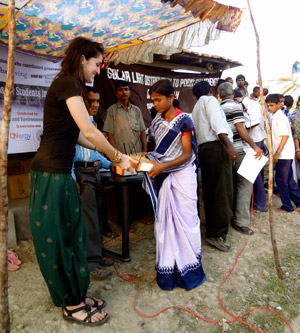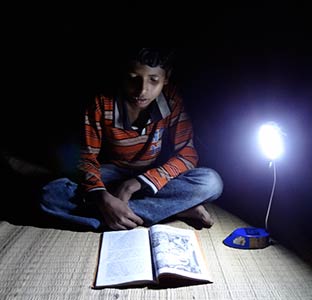"I found purpose"
Study abroad trip leads CSB student to project that brings light to rural area without electricity
June 11, 2012
By Diane Hageman

In America, we take electricity for granted. With the simple flip of a switch, our homes, offices and schools are brightly lit, at any time of the day or night.
Kelsey Torchia, a College of Saint Benedict environmental studies major, found out first-hand this is not the case in many rural areas of India.
Through an internship with the Association for Social and Environmental Development (ASED) in Kolkata, India, Torchia was a key person in helping to raise funds to purchase solar lights for children who live in the Sundarbans region of India.
Torchia, an incoming senior from Rochester, Minn., was one of 12 College of Saint Benedict students and three Saint John's University students who studied abroad in Kolkata, India, this past spring. It is experience she describes as "whirlwind." Looking for a challenging program with a service component and home-stay opportunity, Torchia landed on the India program.
"I call it my trifecta," she said. "I was able to go to school there, live with a host family and volunteer with a service organization. It allowed me the opportunity for complete immersion into a different culture."
Internship through India study abroad experience
For her service-learning project, Torchia was a research intern with ASED, an organization that promotes nature conservation through public awareness, action research and people's participation.
It was through this experience that she learned about the plight of the rural families in India, particularly in the Sundarbans (which means "beautiful forest"), located roughly 60 miles south of Kolkata. "At a certain point past Kolkata, there is no electricity. The sun goes down at 6 p.m. and it obviously gets really dark," Torchia said. "People living here use kerosene for heating, cooking and light, which is costly and can be dangerous. It is really problematic."
Diti Mookherjee, the chief executive officer of ASED, had visited CSB and SJU earlier through the relationship the colleges have with St. Xavier's University in Kolkata. Mookherjee met with Torchia to discuss the internship.
 Sundarbans solar lamp project
Sundarbans solar lamp project
Mookherjee gave Torchia the opportunity to take charge of a project. Torchia chose the Sundarbans Solar Lamp Project, which has a goal to raise enough money to purchase solar lamps for 1,600 students at a cost of $25 each for children in the Sundarbans to use for homework and other activities after dark. The individual lamps which have a cobra-head shaped light with a flexible neck. They are also purchasing solar tubelights, at a cost of $115 each, which are being used in a reading space that accommodates 30 students.
The lamps have batteries and are connected to a solar panel. This panel is either set up on the roof of the house or kept out in the sun for charging. It takes about four to five hours to charge the lamp on a sunny day, according to Mookherjee.
Torchia, along with three other CSB students, (Rachel-Ann Aveda Garibsingh, Rachel Ziegler and Kelsey Kircher), developed plans to generate interest from the local community as well as individuals outside of Kolkata. The cornerstone of the project was an informational video they created.
In all, Torchia took four eight-hour trips to the Sundarbans area where she helped tutor students, filmed her video and participated in the presentation of 300 solar lamps to the children.
The third trip was dedicated to videotaping for the project. With the assistance of a translator, Torchia visited the rural households, capturing "before and after" photos of the students and families using kerosene and then with their solar lamps. On the fourth trip, she was able to give the children photos of themselves with their solar lamps as well as deliver more lamps. "We felt like celebrities," Torchia said. "The people are so giving. They treat guests like gods and were so excited to receive lamps."
ASED started the solar lamp project in 2011. Since then more than $12,000 has been raised and they hope to raise another $10,000 to be able to reach the goal.
"Donations have significantly increased and we learned that donors respond quite well to the visual aids," she said. "We targeted youth, as well, to become involved in our projects through Facebook and updating the ASED website to keep up with today's contemporary world. I have specifically taken the initiative to link students from St. Francis Xavier University, CSB and SJU with ASED to keep the interest and projects continuing."
Looking to the future
Torchia intends to link this project to her senior thesis and to expand upon it after graduation. She hopes to apply for a Fulbright scholarship and return to India to continue her work with ASED.
"I learned so much from this project. It's amazing what a difference one lamp can make," Torchia said. "Personally, I have left a large part of myself in the Sundarbans, but at the same time, I found a significant part of myself there as well. I lit a desire in my heart to return. I found purpose."
